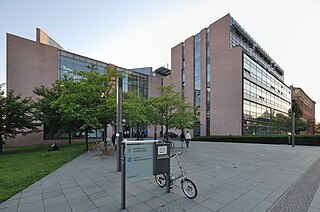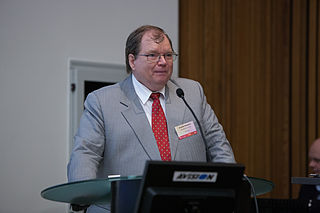Related Research Articles
Bonnie Lynn Bassler is an American molecular biologist; the Squibb Professor in Molecular Biology and chair of the Department of Molecular Biology at Princeton University; and a Howard Hughes Medical Institute Investigator. She has researched cell-to-cell chemical communication in bacteria and discovered key insights into the mechanism by which bacteria communicate, known as quorum sensing. She has contributed to the idea that disruption of chemical signaling can be used as an antimicrobial therapy.

The Max Planck Institute of Biochemistry (MPIB) is a research institute of the Max Planck Society located in Martinsried, a suburb of Munich. The institute was founded in 1973 by the merger of three formerly independent institutes: the Max Planck Institute of Biochemistry, the Max Planck Institute of Protein and Leather Research, and the Max Planck Institute of Cell Chemistry.

The Max Planck Institute for Biophysical Chemistry, also known as the Karl-Friedrich Bonhoeffer Institute, was a research institute of the Max Planck Society, located in Göttingen, Germany. On January 1, 2022, the institute merged with the Max Planck Institute for Experimental Medicine in Göttingen to form the Max Planck Institute for Multidisciplinary Sciences.

The Gottfried Wilhelm Leibniz Prize, or Leibniz Prize, is awarded by the German Research Foundation to "exceptional scientists and academics for their outstanding achievements in the field of research". Since 1986, up to ten prizes have been awarded annually to individuals or research groups working at a research institution in Germany or at a German research institution abroad. It is considered the most important research award in Germany.

National Centre for Biological Sciences (NCBS) in Bangalore, Karnataka, is a research centre specialising in biological research. It is a part of the Tata Institute of Fundamental Research (TIFR) under the Department of Atomic Energy of the Government of India. The mandate of NCBS is basic and interdisciplinary research in the frontier areas of biology. The research interests of the faculty are in four broad areas ranging from the study of single molecules to systems biology. Obaid Siddiqi FRS was an Indian National Research Professor and the Founder-Director of NCBS. He made seminal contributions to the field of behavioural neurogenetics using the genetics and neurobiology of Drosophila.

The Max Planck Institute for Infection Biology (MPIIB) is a non-university research institute of the Max Planck Society located in the heart of Berlin in Berlin-Mitte. It was founded in 1993. Arturo Zychlinsky is currently the Managing Director. The MPIIB is divided into nine research groups, two partner groups and two Emeritus Groups of the founding director Stefan H. E. Kaufmann and the director emeritus Thomas F. Meyer. The department "Regulation in Infection Biology" headed by 2020 Nobel laureate Emmanuelle Charpentier was hived off as an independent research center in May 2018. The Max Planck Unit for the Science of Pathogens is now administratively independent of the Max Planck Institute for Infection Biology. In October 2019, Igor Iatsenko and Matthieu Domenech de Cellès established their research groups at the institute, Mark Cronan started his position as research group leader in March 2020. Silvia Portugal joined the institute in June 2020 as Lise Meitner Group Leader. Two more research groups where added in 2020, Felix M. Key joined in September and Olivia Majer in October, completing the reorganization of the Max Planck Institute for Infection Biology. Simone Reber joined as Max Planck Fellow in 2023 and now heads the research group Quantitative Biology.
The Max Planck Institute of Molecular Plant Physiology is a German research institute for molecular plant physiology, based in the Golm district of Potsdam, Brandenburg. Founded on 1 January 1994, the MPIMP focuses on the study of the dynamics of plant metabolism and how that relates to the entire plant system. The institution is one of the 80 institutes in the Max Planck Society (Max-Planck-Gesellschaft).
Franz-Ulrich Hartl is a German biochemist and the current Executive Director of the Max Planck Institute of Biochemistry. He is known for his pioneering work in chaperone-mediated protein folding.

Founded in 2007, the Joan and Sanford I. Weill Institute for Cell and Molecular Biology is a collaborative, non-profit research institution located on Cornell University's campus in Ithaca, New York. The Weill Institute consists of twelve faculty-led teams, appointed in several life sciences departments within Cornell University. The "cornerstone" of the University's $650 million New Life Sciences Initiative, the Institute is intended to foster multidisciplinary, collaborative research efforts toward answering fundamental questions in cell and molecular biology.

The Max Planck Institute (MPI) for Biology of Ageing, founded in 2008, is one of over 80 independent, non-profit-making institutes set up under the umbrella of the Max Planck Society. The overall research aim is to obtain fundamental insights into the aging process and thus to pave the way towards healthier aging in humans. An international research team drawn from almost 30 nations is working to uncover underlying molecular, physiological and evolutionary mechanisms.

Scott D. Emr is an American cell biologist and the founding and current Director of the Weill Institute for Cell and Molecular Biology at Cornell University, where he is also a Frank H.T. Rhodes Class of 1956 Professor at the Department of Molecular Biology and Genetics.

Anthony Arie Hyman is a British scientist and director at the Max Planck Institute of Molecular Cell Biology and Genetics.

Klaus Weber was a German scientist who made many fundamentally important contributions to biochemistry, cell biology, and molecular biology, and was for many years the director of the Laboratory of Biochemistry and Cell Biology at the Max Planck Institute for Biophysical Chemistry in Göttingen, Germany.

Andres Metspalu is an Estonian geneticist and member of the Estonian Academy of Sciences.

Roger Sidney Goody is an English biochemist who served as director at the Max Planck Institute for Molecular Physiology in Dortmund from 1993 until 2013. Since 2013 he is Emeritus Director of the institute.
Tobias C. Walther is the chair of the cell biology program at Sloan Kettering Institute in New York City and a professor at Weill Cornell School of Medicine, where he co-directs the Farese and Walther lab. He has been a Howard Hughes Medical Institute investigator since 2015. His primary responsibilities are to provide leadership in research and teaching in the scientific fields of metabolism, membrane biology and lipids.
Heinrich (Henri) Jasper is a German-American biologist at Buck Institute for Research on Aging. He was formerly a professor of biology at The University of Rochester. He studies aging, stem cell function, and tissue regeneration.
Roy R. Parker is a biochemist who has been an active investigator in science since the 1970s. He is currently a Distinguished Professor of Chemistry and Biochemistry and Cech-Leinwand Endowed Chair of Biochemistry at the University of Colorado Boulder. Throughout his life, Parker has contributed a vast degree of knowledge to research and studies of biochemistry. His current focus includes the biogenesis, function, and degradation of multiple forms of RNA in eukaryotes. Parker aims to use his research to understand how various diseases and pathologies result from abnormalities in RNA. In 2012, Parker was elected to the National Academy of Sciences in Biochemistry.
Ruth E. Ley is a British-American microbial ecologist. Ley was an associate professor in the Department of Microbiology and the Department of Molecular Biology and Genetics at Cornell University until 2018. She is currently serving as the director of the Microbiome Science Department at the Max Planck Institute for Biology.
Wolfgang P. Baumeister is a German molecular biologist and biophysicist. His research has been pivotal in the development of Cryoelectron tomography.
References
- "Anthony Bretscher Faculty Profile". Cornell Department of Molecular Biology & Genetics. Retrieved 21 April 2009.